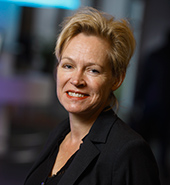Contact North | Contact Nord interviews leading practitioners in online, open and flexible learning as part of sharing best practices with the sector.
Michael Teutsch is the Head of Unit, Country Analysis, in the Directorate-General for Education and Culture at the European Commission. His unit is responsible for the analysis of national education systems and policies, focused on supporting European Commission programs that further growth, jobs, and structural reforms, as well as the development and implementation of EU and national policies through peer learning between countries. In the interview, Michael talks about the results of the European Union report, The Education and Training Monitor 2015, that puts the spotlight on education priorities most in need of investment and identifies policies that help improve the inclusiveness, quality and relevance of Europe's education and training systems. The comments and opinions expressed in this interview are those of the interviewee and do not necessarily reflect the European Commission’s views or opinions. Paul Rühl has been Managing Director of the Bavarian Virtual University (BVU) (Virtuelle Hochschule Bayern) since its founding in 2000. The BVU is an institute set up by 30 Bavarian universities and universities of applied sciences and funded by the Free State of Bavaria in Germany. The BVU finances the production and the operation of online courses, which the member universities can integrate into their programs. All courses provide individual tutoring and are free of charge for students of the member universities. In the 2014-2015 academic year, there were 150,000 enrolments by nearly 50,000 Bavarian students. Paul stresses that cooperation and coordination are the core of the Bavarian Virtual University, as funding is provided to universities for the joint preparation of online courses that can be used by all member institutions. In our conversation, Paul that covered topics such as the BVU approaches to collaboration, course development, funding, scheduling, course integration, as well as ongoing challenges. He also describes the importance of stimulating cooperation between institutions from the start. Paul Hunter is the Director of the Corporate Learning Network (CLN) at IMD, the International Institute for Management Development, one of the world’s leading business schools, based in Lausanne, Switzerland. One of CLN’s programs is Global Leadership in the Cloud, offering an online learning program for busy executives. The program was developed with attention to quality and leaner engagement and relevance, has achieved a 92% completion rate and continues to grow. During our dialogue, Paul talks about the Global Leadership in the Cloud model, its characteristics and key elements, as well as the students and their requirements, how online compares to face-to-face, and the program’s potential. The Model: Paul begins with a description of the IMB Global Leadership in the Cloud program including: David Price, OBE, is a learning futurist and a Senior Associate at the Innovation Unit of We Do Things Differently in London, UK and author of the best-selling OPEN: How We’ll Work, Live and Learn In The Future about the global shift towards open organizations, and systems of learning. David leads organizational, national and international learning projects, solving the problems of employee, student and civic disengagement; maximizing our potential to be creative, innovative and fulfilled citizens. In the interview, David shares his ideas of how social learning is changing the requirements for institutions, including: Dr. Anka Mulder is Vice-President for Education and Operations at the Delft University of Technology in The Netherlands. Dr. Mulder’s particular interests include the quality of and access to education, and she has been actively involved in the development and promotion of online learning worldwide. Dr. Mulder stressed that online learning should not be seen as a goal but as a means to improve learning on-campus and to reach students around the world. As part of changing the mindsets of universities – encouraging them to be bold – she highlights two particular goals: universities becoming their own brokers and the establishment of alliances to award credit for MOOCs. To illustrate these points, Anka drew analogies with private companies: Airbnb (the website for people to list, find and rent lodgings) and Uber (a site connecting riders to drivers in cities around the world), which would serve as models for universities, acting as brokers of products and services. Using the analogy of an airline alliance, she then talked about an alliance of universities which she is working to establish, so that six universities 






